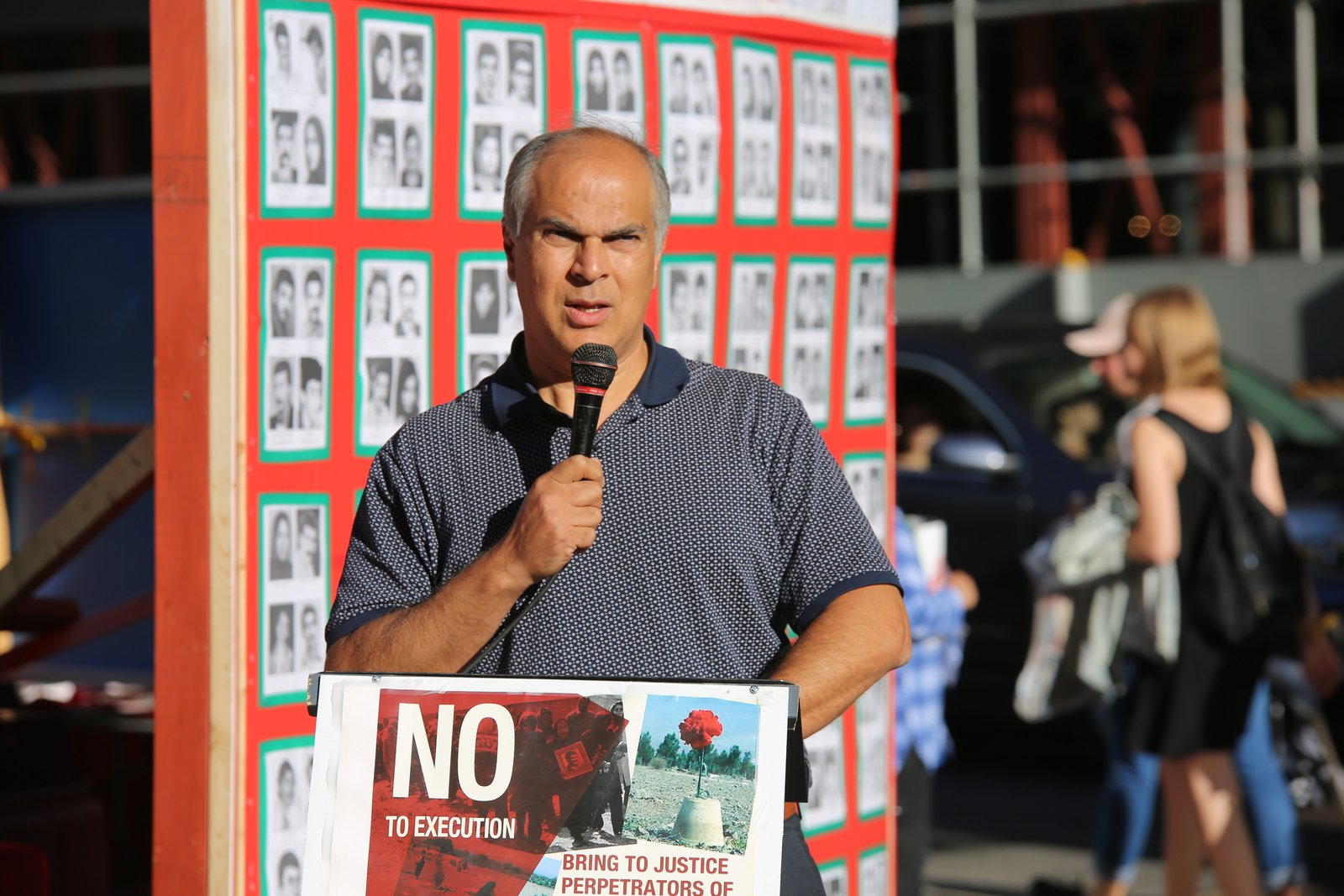
Resolution of demonstrations, protests and hunger strikes by the supporters of Iranian Resistance in Canada
Twenty eight years ago, in the summer of 1988 in a horrific massacres and genocide, more than 30 thousand political prisoners, who were typically serving their sentences or their sentences had finished, were handed to the death squads with the fatwa of the then leader of the mullahs’ regime.
1 – The publication of a shocking audio tape in which the former heir to then-Iranian regime’s supreme leader, Khomeini, a meeting with members of the “death commission” 28 years ago (August 15, 1988) reveals new information about the scope and breadth of the massacre of political prisoners at the time.
2 – In the audio tape, Hossein-Ali Montazeri, who was subsequently dismissed as the heir by Khomeini, for these very remarks, tells members of the “death commission”, Hossein-Ali Nayyeri, the regime’s sharia judge, Morteza Eshraqi, the regime’s prosecutor, Ebrahim Raeesi, deputy prosecutor, and Mostafa Pourmohammadi, representative of the Ministry of Intelligence and Security (MOIS), “The greatest crime committed during the reign of the Islamic Republic, for which history will condemn us, has been committed by you. Your (names) will in the future be etched in the annals of history as criminals.” He adds, “Executing these people while there have been no new activities (by the prisoners) means that … the entire judicial system has been at fault.”
3 – In the meeting, Montazeri tells Pourmohammadi that the MOIS had planned this massacre many months before. “(The ministry of) Intelligence wanted to do it (the massacre) and had made investments. And, Ahmad (Khomeini’s son) had been personally saying for three or four years (prior to the massacre) that the MEK (Mujahedin-e Khalq) must all be executed, even if they read their newspapers, publications and statements.,” he says, adding, “The Mujahedin-e Khalq are not simply individuals. They represent an ideology and a school of thought. They represent a line of logic. One must respond to the wrong logic by presenting the right logic. One cannot resolve this through killing; killing will only propagate and spread it.”
4 – In rebuking the members of the “death commission,” Montazeri says, “For God’s sake, it is the month of Moharram, the month of God and the Prophet. At least feel some shame from Imam Hussein. Cutting off all meetings and suddenly engaging in such butchery!!… Is something like this done anywhere else in the world? Beware of fifty years from now, when people will pass judgment on the leader (Khomeini) and will say he was a bloodthirsty, brutal and murderous leader…. We will not be in power forever.”
5 – As regards the role of the then-head of the regime Judiciary, Montazeri says, “Mr. [Abdulkarim] Moussavi Ardebili, who I know is the most liberal of all, says during the Friday prayers that all of these people must be executed. And then people chant during the Friday prayers that the Monafeqin (Mujahedin) prisoners must be executed… And when he wants to ask the Imam, instead of telling him that [executions] on such vast scale does not serve our interests and would be damaging, he asks whether we should execute them in the provinces or in the cities.”
6 – In the audio, the members of the “death commission” admit that the families of many of those waiting to be executed had already been executed and that they had been 15 or 16 years of age at the time of their arrest.
7 – Mostafa Pourmohammadi is currently the justice minister in Hassan Rouhani’s cabinet and Hossein-Ali Nayyeri is the current head of the Supreme Disciplinary Court for Judges. Ebrahim Raeesi was the clerical regime’s prosecutor up until several months ago and has recently been appointed by supreme leader Ali Khamenei as the head of the Astan Qods-e Razavi foundation, which is one of the most important political and economic powerhouses in the clerical regime.
8 – Now the day of reckoning of those responsible for this massive crime and all their accomplices and those who have practically served the clerical regime by their silence has arrived. Prosecution of the perpetrators of this crime is the demand of the Iranian people and a necessity to prevent the recurrence of similar incidents anywhere in the world. The international community should end its silence in the face of this crime, which is a clear example of crime against humanity. Silence and inaction is absolutely unjustified.
Given that the words of Mr. Montazeri in the audio clip is a new and undeniable document showing the dimensions of the crimes of the authorities of the religious dictatorship regime ruling Iran, on behalf of the families of victims of this massacre and Iranian communities in the country, we urge the Government of Canada:
A. To recognize the massacre of 1988 as a crime against humanity and to strongly condemn it, as the unanimous motion of the Canadian Parliament did;
B. Our government representative in the UN Human Rights Council session in Geneva demands and international inquiry about this crime.
perpetrators and those who are responsible for this crime must be tried in international tribunals to face justice;
C. Our government leads the condemnation of this massacre in the resolution of the UN General Assembly this year;
D. To take all necessary steps to prosecute those responsible for these crimes by the International Criminal Court or the formation of an international tribunal including raising the issue at the UN Security Council for this purpose.
Iran Democratic Association
Association des Iraniens Democrates du Quebec
International Coalition of Women against Fundamentalism

